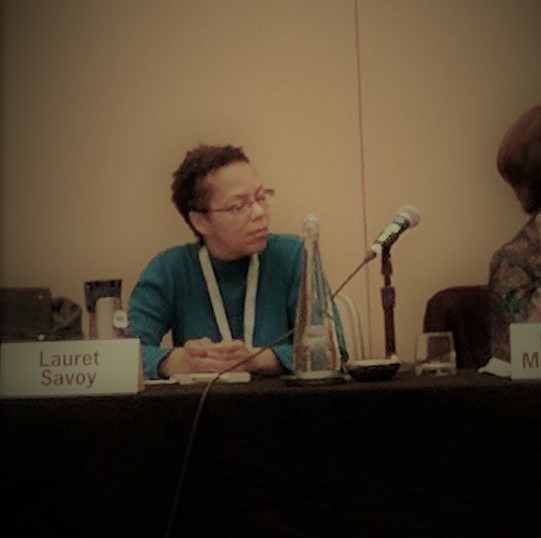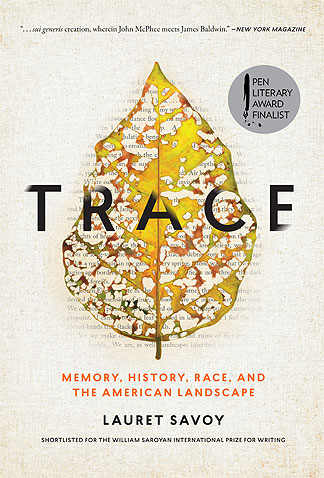The Geologies of Us

When I was in college I took a geology class. I learned about igneous, metamorphic, and sedimentary rocks. I learned about formations and their layers of sand and stone. Whatever their scale – the immensity of a cliff or the insignificance of a pebble – I saw them as inert and objective, separate from or subordinate to the stories of people, including the story of me. Until I heard Lauret Savoy at the AWP conference earlier this month pose questions such as these:
What’s my relationship with history – told and untold on this land? Is it personal as well as geologic?
Savoy’s words pulled me in and I knew immediately that her talk would be the highlight of the conference for me, even though it was only three hours into the first day of the three-day event.
The conference can be overwhelming not just because of the 12,000 writers it draws, but because of the multiple panels from which to choose. I’m often torn, afraid of what I’ll miss out on by skipping one in favor of another. Sometimes I make the right decision – the speakers are engaging, the topic is as advertised, and I’m busily jotting down notes. Sometimes I’m wrong and wonder if I should duck out of the disappointing one and sidle in late to another.
In the four years I’ve attended panels at AWP, how many times have I found myself breathless, blinking back tears, feeling as if the earth had opened up? Exactly once – when I heard Lauret Savoy speak this year.
I’m a fiction writer who occasionally writes an essay, but without actually knowing how to do it, having never really studied the form. I decided to forego the panel on finding structure in fiction and attend instead the panel titled “Imagining the Essay.”
Rebecca McClanahan spoke first and I scribbled such tasty morsels as “each digression spirals, taking us closer to the heart of the essay.” And “ the collision of the different selves.”
I was happy to write these down, even though I had only a sketchy understanding of them. It felt gratifying to take notes. I was more than satisfied with McClanahan’s talk. I thought to myself, yes, this panel was a good choice. Then Lauret Savoy came to the podium and I realized it was a wondrous choice.
Savoy spoke of literary geology and how the history of human experience owes much to the structure of the land.” Literary geology,” she said, “gives us metaphor and language to explore displacement and erosion of human experience over time.”
I nodded, only slightly, but it was as if a rockslide had started in my head. As if the images collected from that geology class decades ago were shaken from dormancy and exploded to bits. Once the dust had settled, there was a whole new vista, a brand-new landscape.
“The U.S. is a country of ghosts,” Savoy said, “each of us affected by memory and loss. When we re-member, we are putting the pieces back together.”
And then this: “Put the eroded world back into words and transform silence.”
It was not just her words that reverberated in me, but the voice that delivered them. Musical and layered, her voice carried the deeply-felt experiences and accumulated geologies of her life.
The only downside of Savoy’s talk was that it ruined me for the remainder of the panel. I couldn’t concentrate on the words of the two speakers who followed her. My brain and heart were still buzzing with her words. Her voice.
When I returned to Seattle, I bought her book Trace at my neighborhood bookstore,  Phinney Books. The book is richly subtitled Memory, History, Race and the American Landscape. This is from the prologue:
Phinney Books. The book is richly subtitled Memory, History, Race and the American Landscape. This is from the prologue:
I’ve long felt estranged from time and place, uncertain of where my home lies. My skin, my eyes, my hair recall the blood of three continents as paths of ancestors – free and enslaved Africans, colonists from Europe, and peoples indigenous to this land – converge in me.
She writes,
Though I’ve racked long-bygone moments on this continent from rocks and fossils – those remnants of deep time – the traces of a more intimate, lineal past have seemed hidden or lost.
And she invites the reader,
Come with me. We may find that home lies in re-membering – in piecing together the fragments left – and in reconciling what it means to inhabit terrains of memory, and to be one.
How can we not follow her?
Donna, my day just got richer, now that you’ve introduced me to Lauret Savoy. Wow. I will share this with my memoir students tomorrow night. And I look forward to reading her book.
Dear Donna,
My gratitude to you is huge. Thank you for this generous blog. Thank you. I’m so glad my words made sense!